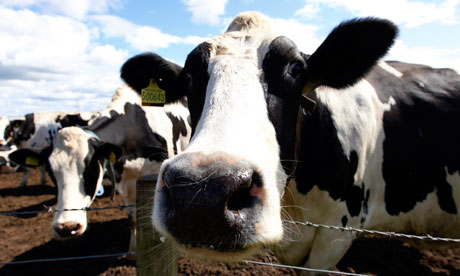
Can you save the planet over lunch? Can the amount of chicken in your curry or milk in your coffee make a difference? Researchers now claim it can: in fact, they say, if we all switched to eating what they would like to see on our plates, we could cut Britain's greenhouse gas emissions by a quarter and be a lot healthier too.
Scientists from the Rowett Institute of Nutrition and Health at Aberdeen University have produced a report which they say has established the ideal diet to balance healthy eating with sustainable food. Calling it the Livewell Plate, the researchers, commissioned by the conservation charity WWF, have drawn up a shopping list and a suggested weekly menu to make Britain's dinners greener. They will now lobby the government and the food industry to use the Livewell diet as a blueprint.
The diet is designed to be familiar, say the researchers, and normal. But crucially it shifts away from processed foods and meat, both blamed for rising levels of heart disease and diabetes. Increasing consumption of meat, especially beef, is one of the key environmental issues for the world.
In the US alone, 70% of agricultural land is given over to growing food for livestock, using huge amounts of water resources. It has led to extensive areas of rainforest being cleared, especially in Brazil, and vast amounts of pesticides and fertilisers ending up in the world's waterways. Processed foods, with their extra production, packaging, transportation and energy consumption, are also an environmental "hotspot".
In the UK, where the average person eats 79kg of meat a year, reducing this intake is deemed crucial by the researchers behind the Livewell plate. Their diet aims to bring down consumption of white and red meat by allowing for 203g a week, or 10kg a year. But the main objective, says WWF, is to streamline and simplify some of these issues for consumers who are becoming increasingly baffled by the choice between Fairtrade, organic and the cheapest produce on offer.
As the politicisation of our dinner plate grows more intense, the supermarket is becoming a minefield for the eco-conscious to navigate. How much fertiliser was used to grow the tomatoes? How many greenhouse gases were emitted by the plane that brought the New Zealand apples?
It's enough to kill the healthiest of appetites, says WWF's head of campaigns, Colin Butfield. "A lot of people we speak to, our members and others, were saying they were overwhelmed by the maelstrom of information over what they should buy: organic, locally sourced, seasonal, Fairtrade, farm standards, the labels are just endless and not everyone has the time to really work out what they should be doing," he said.
"While there are answers to all of people's questions over what they should buy and eat, it's not realistic to expect everyone to be able to devote a lot of time to getting deeply into all the issues. Too many messages are just no good for busy people."
Butfield said the Livewell researchers had done their best to keep the diet simple, taking the standard advice on good nutrition and then factoring in environmental concerns. The cost is manageable, too: the suggested weekly shopping list comes in at just under £29 a person.
"You can still go further and buy organic and look for seasonal foodstuffs, but essentially here is the simple message in the Livewell Plate – eat a little less meat and dairy, bulk out your diet with a little more vegetables and whole grains," said Butfield.
Arthur Potts Dawson, owner of two sustainable restaurants in London and founder of the People's Supermarket, welcomed the report.
"For WWF to add their weight to this kind of issue is fabulous. People need to be able to shop with confidence, and food needs to be trusted again," he said, adding it should not just be an issue for the middle classes but for the entire population.
"Food is polluting this planet and destroying it and anything that can help to educate people is essential now, more than ever. We need to destroy this idea that all you can eat is cardboard and brown; you can still consume, just shop with a bit of knowledge," added Potts Dawson.
As the planet heads for a population of nine billion by 2050, the question of how we are going to feed everyone on it is only going to become more important. Where wars were once fought over gold and oil, they will increasingly be fought over water and farmland and, with the UK so dependent on imported food, our diet is key to the future. "Sustainable eating is a win-win," said Butfield. "And the Livewell Plate demonstrates how easy it could be for everyone."

